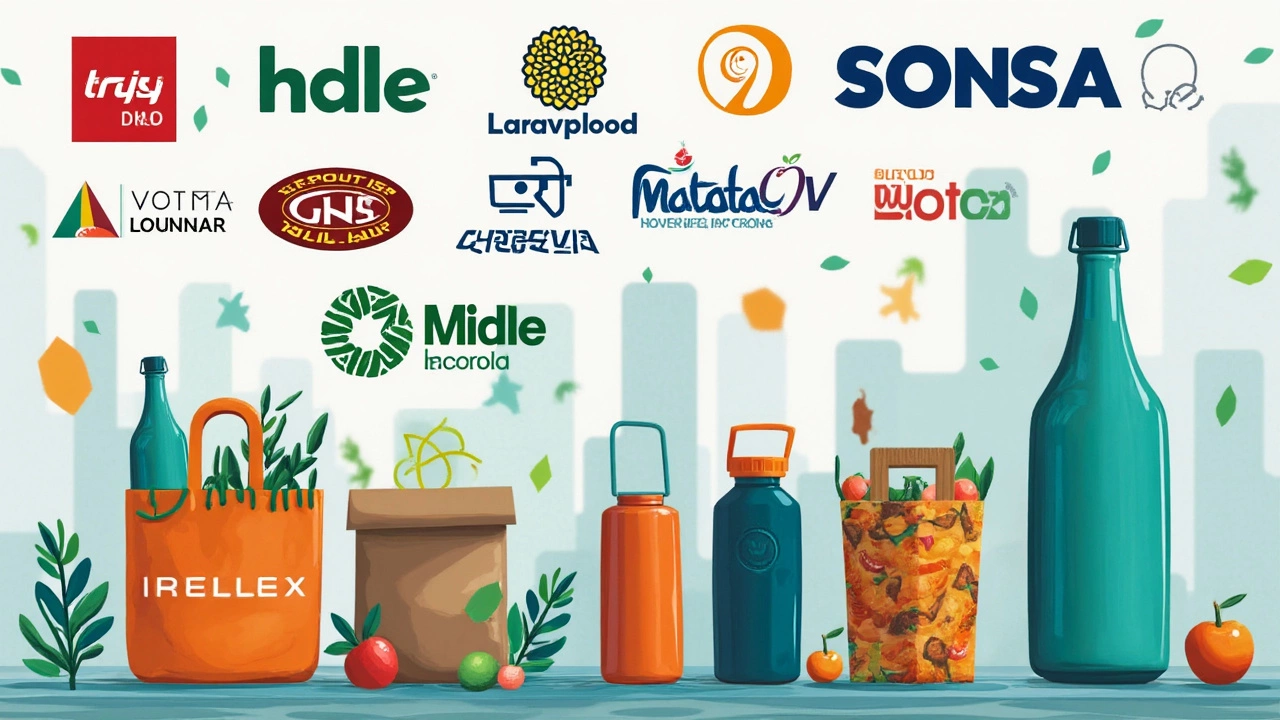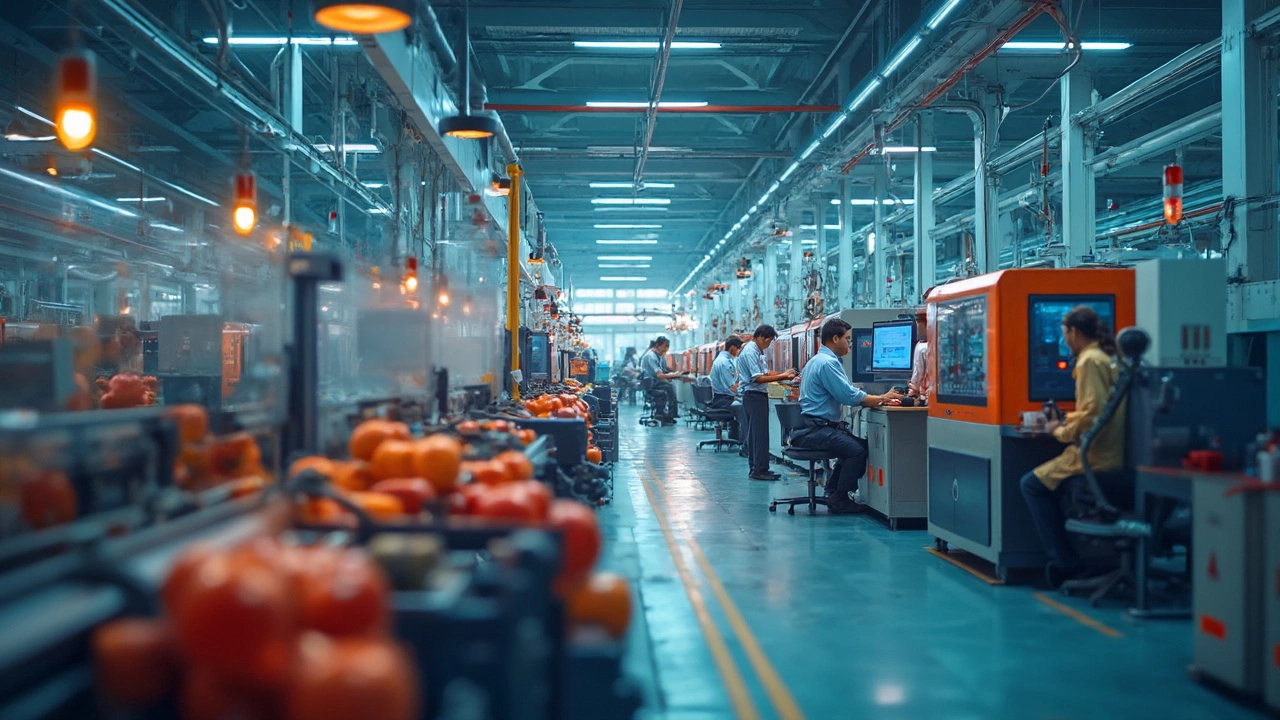With plastic being everywhere, from the bottles in your fridge to the casing on your smartphone, picking a solid plastic manufacturer feels kind of crucial, right? The big question is, who's nailing it in the industry these days? You don't want to end up with low-quality products or shady business practices, so a little due diligence goes a long way.
Some companies have been around long enough to pretty much own the scene, adapting and growing with the demand. The evolution of these companies isn't just about expanding but also about innovating. It's like they're always a step ahead in making plastic better and more sustainable. Now that's something worth noting, especially with all the talk about environment-friendly practices shaking up the industry.
As you scope out the best in the field, keep an eye on those who are killing it with both product quality and new tech. Whether it's cutting-edge polymers or eco-friendly processes, these companies are reshaping how we think about plastic. Seriously, they're setting benchmarks left and right. So, let's break it down by diving into what makes these giants top contenders.
- Evolution of Plastic Industry Giants
- Top Contenders in Plastic Manufacturing
- Innovations Driving Plastic Excellence
- Sustainable Practices in Plastic Production
- Choosing the Right Partner for Your Needs
Evolution of Plastic Industry Giants
The plastic manufacturing world has seen its share of game-changers over the decades. Remember when plastic was just seen as a cheap alternative for your everyday needs? Well, those times have certainly changed. Companies like BASF, Dow Chemical, and LyondellBasell have been at the forefront of this transformation, continually shifting gears to keep up with market demands.
In the early days, innovation was all about volume—producing more to meet growing demand across various sectors like packaging and automotive. But as the industry matured, these giants started focusing on better and more sustainable options, spurred on by environmental concerns and new regulations. Top plastic manufacturers have expanded their research and development efforts to create stronger, lighter, and more eco-friendly materials. BASF, for instance, has made significant strides in bioplastics, catering to businesses eager to reduce their carbon footprint.
As the market grew more competitive, these companies diversified their offerings, delving into specialized plastics for medical use, electronics, and even aerospace. Dow Chemical's emphasis on advanced polymers and specialty chemicals is a classic case of evolving with the times. And let's not forget the tech advances—automation and AI are now pretty much standard practice, helping these behemoths optimize production and quality control.
| Company | Founded | Headquarters |
|---|---|---|
| BASF | 1865 | Ludwigshafen, Germany |
| Dow Chemical | 1897 | Midland, Michigan, USA |
| LyondellBasell | 2007 | Houston, Texas, USA |
It's pretty clear that adapting to change is the name of the game. These industry leaders continue to cement their status by prioritizing sustainability, technological innovation, and a commitment to meeting client needs. If you're hunting for the best in the biz, you can't ignore the trail they've blazed in the plastic industry.
Top Contenders in Plastic Manufacturing
Getting to know the top plastic manufacturers is crucial if you want products that don't just survive the test of time but also make a good impact. Let’s talk about those who are crushing it in the plastic manufacturing world.
One of the big names you can't ignore is Dow Inc. They're huge for a reason. Known for their innovation, they've been whipping up new types of plastics that are used in everything from packaging to high-tech electronics. Their commitment to sustainability also gets them some solid brownie points.
Another titan in the field is LyondellBasell, often hailed as one of the largest plastics, chemicals, and refining companies around. They're notable for their efforts in recycling and striving for a circular economy by making sure plastic is reused rather than wasted.
SABIC, the Saudi Arabia-based company, is making waves with its vast global operations and an expansive portfolio ranging from chemicals to agri-nutrients. They're all about using technology to push the boundaries of what's possible with plastic.
Let’s not forget about BASF. This German-based behemoth focuses heavily on research and development, which helps push the envelope in high-performance automotive and lightweight structures. They’re practically the pioneers of versatile applications in plastic production.
If you're looking for companies that emphasize eco-friendly approaches, Braskem is your go-to. With roots in Brazil, they're renowned for producing biopolymers—a fancy word for plastics made from renewable resources. This is a real game-changer in today’s sustainability-focused market.
To sum it up, the best plastic companies are those that juggle innovation, sustainability, and quality. Partnering with these giants means you're likely to get top-notch products that align with today’s progressive and environmentally conscious world. So, whether it's for a large business venture or a small project, knowing these players puts you one step ahead.

Innovations Driving Plastic Excellence
Plastic manufacturing has come a long way, and it's all thanks to some mind-blowing innovations. The top plastic manufacturing companies aren't just producers—they're pioneers. They're constantly pushing boundaries, ensuring the materials we rely on every day are better, stronger, and more sustainable.
One of the coolest things happening right now is the development of biodegradable plastics. These aren't your typical plastics that end up sitting in a landfill for centuries. Companies are using materials like polylactic acid made from cornstarch or sugarcane, which can break down in a fraction of the time regular plastics do.
Nanotechnology is another game-changer. It sounds super scientific, but it's really about making plastics that are lighter yet stronger. Imagine a car that weighs less, uses less fuel, but is just as tough in an accident. That's where nanotechnology in plastics is heading, and it's a win-win for both the consumer and the environment.
With sustainability at the forefront, recycling tech has also seen a major upgrade. Instead of the traditional methods, which often result in downgraded materials, companies are investing in advanced recycling that breaks down plastics to their base molecular components. This means they can be reused as high-quality materials repeatedly without losing their integrity.
Let's not forget the digital revolution. Automation and AI in plastic manufacturing are making production faster and more efficient. Smart factories are optimizing energy use, reducing waste, and even customizing plastic materials to specific needs more precisely than ever before.
Here's a pretty neat stat to chew on:
| Innovation | Impact on Production |
|---|---|
| Biodegradable Plastics | Reduces landfill waste significantly |
| Nanotechnology | Increases strength while reducing weight |
| Advanced Recycling | Maintains material quality with higher reuse potential |
Bottom line is, the plastic industry is seriously transforming, and these innovations aren't just buzzwords—they're actively reshaping the landscape. Next time you sip from that seemingly simple plastic bottle, remember, there's a whole world of innovation behind it aiming to make it better and greener.
Sustainable Practices in Plastic Production
Ever wondered how those eco-friendly plastic products make it to your shelves? The journey is pretty fascinating, and it all starts with some smart sustainable practices in the industry. These days, many plastic manufacturing companies are stepping up to the plate, showing us that you can churn out quality plastic while keeping an eye on Mother Earth.
Let's kick things off with some known practices. First up, recycling. Sounds basic, right? But it's a big deal! Companies are investing heavily in closed-loop recycling systems where the waste plastic goes back into the production cycle rather than ending up in landfills. This approach doesn't just save the planet but also cuts down on production costs. Win-win!
Then there's the shift towards biodegradable plastics. Imagine plastics that break down over time without leaving toxic residue. More and more companies are experimenting with organic alternatives made from corn starch or sugarcane. Sure, they're a bit more costly right now, but as demand grows and tech improves, prices are likely to drop.
Now, let's talk energy. Many top plastic manufacturers are turning to renewable energy sources. Solar-powered factories and wind energy are becoming a common sight. By reducing reliance on fossil fuels, these firms not only cut emissions but also often see a dip in energy costs over time. The future's looking green, folks!
| Practice | Benefit |
|---|---|
| Closed-loop recycling | Reduces landfill waste and cuts costs |
| Biodegradable solutions | Lowers environmental impact |
| Renewable energy use | Reduces carbon footprint and operational expenses |
Lastly, transparency is key. Consumers want to know where their stuff comes from and how it's made. Many brands are super open about their processes, with detailed reports and sustainability ratings. Keeping it real with buyers fosters trust and builds loyalty.
So, next time you're shopping around for plastic products or partners, think about who’s leading the charge in sustainability. Chances are, they’re not just making a difference in their field but are also setting the stage for the industry as a whole.

Choosing the Right Partner for Your Needs
Picking the best plastic manufacturing company isn’t just about who's got the flashiest tech. Sure, innovation's a big deal, but there's more to dig into. Let's break down some essential things to think about when you’re on the hunt for the right partner.
First up, let's talk about the company's track record. How long have they been in the game? A company with a history of happy clients is gold. It shows reliability and trust. Don’t just take their word for it—check out reviews, case studies, or get a few references if you can.
Next, check if they’ve got the capacity to meet your needs. It’s all fine if they make killer products, but do they have the bandwidth for your orders? Look into their production capabilities. Do they make small batches, big volumes, or both? Know your own needs before diving in.
Quality standards are non-negotiable. Ensure they follow the industry's best practices. Certifications like ISO 9001 are a solid indicator of a company's dedication to quality. Keep an eye on these to avoid headaches down the road.
Don’t skip over their sustainability practices. With environmental issues being a hot topic, associating with an eco-conscious company might be something your biz needs. Check out if they use recycled materials or have efficient waste-reduction processes in place.
Lastly, gauge their customer service. You want someone who's as invested in your success as you are. Are they responsive, proactive, and eager to help solve problems? A good relationship here might just smooth out bumps along the way.
So, take your time and weigh these factors. It could mean the difference between a thriving partnership and a stressful experience. Making the right choice is all about aligning those details with your specific requirements.
